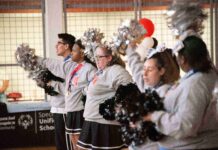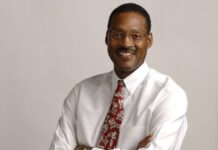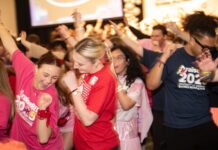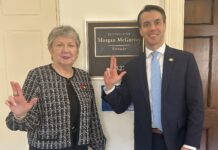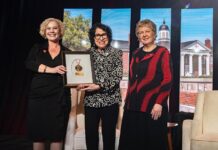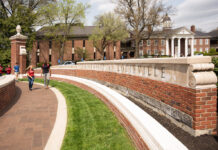
Becoming a doctor is more than learning anatomy and medicine for a group of University of Louisville medical students. They also want to help children affected by violence in Louisville.
Whether they are victims themselves or witness violence involving someone they know, children exposed to violence experience emotional and psychological trauma. A group of social-justice-minded students in the UofL School of Medicine have created Future Healers, a mentorship program to provide these children with new goals and new role models.
The idea grew out of the White Coats for Black Lives rally held on the Health Sciences Center campus in June 2020 in support of health equity and social justice. Members of the UofL chapter of the Student National Medical Association who spearheaded the rally wanted to continue work to mitigate the effects of violence in the city, which has been rising over the past several years.
“The rally was great, but that was just a temporary way for us to show support,” said Karen Udoh, a third-year medical student and then-president of the UofL SNMA chapter. “We were brainstorming about how we could get our departments and students involved with long-term initiatives that really would be an asset for the community.”
With support from SNMA faculty advisers Keith Miller and Christopher Jones in the UofL Department of Surgery, along with the UofL Health – Trauma Institute and Christopher 2X, a local anti-violence advocate and executive director of Christopher 2X Game Changers, they formulated the program to help children overcome the effects of violence by inspiring them to become healers themselves.
Out of this collaboration, the Future Healers program was born.
Following a pilot program with preschoolers at the Chestnut St. YMCA in early 2021, the students worked with Miller, a trauma surgeon, and Jones, a transplant surgeon, to create a series of videos and interactive learning modules for preschoolers to young teens that teach them about anatomy, health and healing and introduce the idea of becoming a health care professional.

The students present the modules at monthly sessions for the preschoolers and for Future Healers Ambassadors, kids from the community ranging in age from 4 to 13 who have been exposed to violence. As of February, the Ambassadors included 80 kids, with 10 more preschoolers participating through the YMCA.
“These students and the surgeons are providing hopeful images to show these kids a different path, to get them interested in the medical arena,” 2X said.
UofL alumna and SNMA member Zahara Gully, director of the Future Healers education committee, said they try to put themselves in the place of the kids as they develop the programs.
“We thought about ways our younger selves would have enjoyed learning about medicine and health. We incorporated a lot of hands-on activities,” Gully said. “The first activity we did, in October, was around nutrition and the food groups. We had the kids decorate fruit as Halloween characters. We had pompoms and bandage tape and they dressed up bananas as mummies.”
Gully, who teaches anatomy and biology at Jefferson Community and Technical College, said she hopes the kids retain at least some of the information.
“Of course, not everything is going to be remembered, but to have kids say, ‘Mom, I know what the strongest bone in the body is! It’s the femur!’ Those moments are priceless,” she said.

In addition to getting the kids interested in the sciences, medicine and health care, the monthly sessions include a care component to help them cope with stresses related to exposure to violence.
“We have additional elements to make sure we’re taking care of their other needs as well, because a lot of them are coming into our space just having a loved one shot earlier that week or hearing gunfire the night before,” Udoh said. “They’re constantly being exposed to violence, so we always take time within our sessions to address mental health to have different exercises where there are ways for them to express themselves.”
For May, the group is planning an entire session focused on mental health with assistance from child psychiatrists and psychologists.
2X believes the Future Healers program will help give the kids an alternative vision for their lives.
“It’s not their job to stop the violence, but these medical students and the doctors are creating a narrative that they are here as healers and want to be an example to these young victims,” 2X said. “There is no better partner than UofL and UofL Health, with the medical students and the surgeons showing an interest in these kids. You can’t describe the value of that. The kids and the parents have bought into it. It’s unique, it’s magical.”
The medical students also volunteer for other Ambassadors events, such as the Got Zoo Buddies program at the Louisville Zoo. The students are motivated to help the kids, but as future physicians, the understanding they gain about their community also is valuable.
“Our mission with Future Healers is to build better bridges between health providers and the communities they serve,” said Satya Alluri, a third-year UofL medical student and Future Healers wellness director. “Not only is it beneficial for the kids to have representation, to see people of color as doctors and have mentors to help them dream bigger, it helps us as future physicians to see first-hand how our current socioeconomic structures impact the health and well-being of patients. It helps us become better physicians and surgeons.”
Briana Coleman, a third-year UofL medical student and Future Healers technology director, appreciates the opportunity to make a difference for her community even while she is preparing for her career in medicine.
“It’s a passion of mine to help out with the community,” Coleman said. “You don’t want to see any violence or any bad things happen to the people around you. My message to all is you need to get out there get involved in anything because you can really make a difference, even if you are just a student.”
To learn more or to get involved, email Future Healers.













